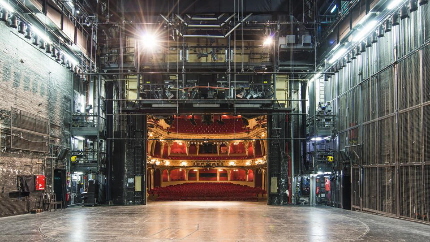 PART ONE
PART ONE
TO READ PART TWO CLICK HERE
By Bill Hirschman
One month into the nation-wide shutdown of live communal theater due to COVID-19, South Florida companies, like those in so many other regions, are trying to write Act Two with little clue how Act Three will play out.
Theater professionals are legendarily bi-polar about their art so crucially melded with commerce: a schizoid hosting of optimism and pessimism, unbridled dreaming and clear-eyed pragmatism.
So 18 leaders from 14 South Florida companies, venues and agencies limned this tale of confident hope and chilling fear, cold balance sheets with seven digits in the red, and blue sky imagining what the theater world will look like in two, three, eighteen months from now.
For this two-part series finishing Sunday, they discussed the chances of survival for themselves and the industry, the potential fiscal and artistic damage, the challenges they are wrestling, how they have been coping, their efforts to stay connected to patrons and artists, how many subscribers are hungry to return, and what the brave new world might look like.
TO BE OR NOT TO BE
Will every company survive? Every person interviewed expressed confidence that their theater will reopen — assuming the curtains can rise again by early fall. But they wonder if everyone else can.
A few acknowledged that a longer delay could cripple their operation. And a very few acknowledged they might not survive a protracted hiatus.
Andy Rogow, artistic director of the gay-centric Island City Stage in Wilton Manors, predicted their ultimate survival, but “I think that one or two theaters may end up having to close simply because they either didn’t have reserves or their overhead is too high. Maybe we’re going to be one of them (depending on) how long it goes,” noting that his company could hang on through October.
Christopher Demos-Brown, playwright and a co-founder of Zoetic Stage in Miami, offered, “I think this will pass but I think pretty much all of the live theater world is going to lose a season. But after that, I think it’s going to be back in business as usual provided all of the people who are involved can ride it out.”
The ultimate financial loss – likely millions of dollars across the region — is a mystery because it depends on a handful of dollars-and-cents unknowns. How long until venues can reopen? Will some titles be pushed deeper into the calendar or be scrapped? How eager or skittish will patrons be about subscribing or even attending? How will those attitudes affect single-ticket and impulse buying – the growing trend in box office sales over the past decade in South Florida as opposed to subscriptions?

Kelley Shanley
Company leaders working hard with their calculators now estimate scenarios ranging from encouraging to nightmarish. Their worst case scenario totals are unnerving. “If the Broward Center remains closed through September, it will mean $10 million in lost revenue,” wrote Kelley Shanley, president and CEO of the Fort Lauderdale presenting/producing house.
Besides the loss of ticket sales already in the bank and even spent on the next production, there likely will be a decrease in contributions. Marilynn Wick, CEO of the Wick Theatre in Boca Raton, said one of her donors reported losing $5 million in the crippled stock market.
In the past, the Wick’s bottom line has been buttressed by its sister firm, the national Costume World operation. But a majority of the summer festivals that it services have been cancelled as well as nearly half of its upcoming contracts going into the rest of the year. That translates into concrete consequences: The company is already two weeks behind on its payroll; the upcoming paycheck will likely be the last for a while, she said.
Some large companies known for careful fiscal stewardship like Palm Beach Dramaworks had squirreled away reserves. The three presenting houses have endowments that they can draw from. But some endowments are tied to the limping stock market. Also, Palm Beach groups get some operating funds from a county hotel bed tax that is expected to take a serious hit. In total, the Maltz Jupiter Theatre “could potentially (lose) a million dollars in our budget next year,” reported Andrew Kato, CEO and producing artistic director.

Johann Zietsman
The Arsht Center’s President and CEO Johann Zietsman wrote that the Miami facility “has been in good financial standing for some time and we are optimistic that we can weather this storm. However, there is no doubt that this crisis has had and will have a deep financial impact. We could face a revenue loss in the millions if every ticket holder for canceled and rescheduled shows requests a refund.”
While the actual weekly running costs of a show will be saved, even some of the smaller companies have overhead that continues. Island City Stage has the salary of its only full-time employee, Managing Director Martin Childers, plus rent at the Wilton Theater Factory. “When you start to talk about four or five months of rent, that’s more than $20,000 now with no income,” Rogow said.
The key is that a quarter to even three-quarters of the operating income for most non-profit theaters comes from ticket sales, concessions, rentals and other “earned income.” The balance comes from public and private grants plus donations. That creates the potential for a “devastating” effect for any size company “because the financial structure of the arts community is pretty fragile to begin with,” said Michael Spring, director of the Miami-Dade County Department of Cultural Affairs. “If you’re not up and running, you’re not earning money.”
Among the high-profile cases is Miami New Drama, which was one day away from opening the world premiere of the Louis Armstrong bio-musical A Wonderful World with an investor-supported budget reported between $1.2 million and $1.5 million. The company has retained the sets, the costumes and hopes to remount it with the same cast and creative team. But a six-month delay will likely cost $600,000 to $800,000, said Artistic Director Michel Hausmann.
Dealing with the fiscal loss will be significant since many operations, even the financially healthy ones, rely heavily on a strong steady cash flow to fund the upcoming titles and the continuing operation of the entity. Theaters that were days or a few weeks from opening another show have already spent thousands, even hundreds of thousands of dollars in upfront expenses from licensing to Equity bonds to design fees to rehearsal pay – expenses that either are lost or cannot be recouped unless the show is remounted months or even a year from now.
Camelot was close to opening at Actors’ Playhouse in Coral Gables with all of the pre-production costs expended. “That’s easily a $200,000 to $300,000 loss,” said Executive Producing Director Barbara Stein.
But depending on developments, the Playhouse could lose a million dollars because some revenue streams might not be apparent to patrons. The loss of its children’s theater production slated for May could deduct $70,000 from the net asset column. If they cannot open the venue until later in the summer, they would lose $35,000 from its profitable sideline renting out the facility, even more if they can’t open their summer camp.

Patrick Fitzwater
Another aspect of pain is the emotional loss of the creative investment of the artists in what their leaders expected to be some of the best (and most expensive) work of this and past seasons. Slow Burn Theatre in Fort Lauderdale anticipated that its epic-scaled Ragtime would be one of its major artistic successes. “It is the heartbreak,” said co-founder, director and choreographer Patrick Fitzwater. “The fact is (the work on Ragtime) feels like a lot of foreplay right now and you didn’t get the payoff at the end. Everybody is just kind of waiting to show their art.”
Just how wide and deep will the losses reach? To “draw an outline” around the continually evolving impact, the Miami-Dade County Department of Cultural Affairs created a “financial tracker,” a spreadsheet being distributed to as many arts group that agree to participate. It tracks revenue losses and expenses. Then the department asks the participants to submit the information. Aggregated figures will be issued publicly on a monthly basis across the community. It also asks artists to identify their most pressing problems.
SORRY-GRATEFUL: THE CHALLENGES
Some challenges are obvious, others not so apparent, but most are mired in the only absolute at this moment: absolute uncertainty about everything except the commitment to reopen and the need for theater in people’s lives.
The nagging question uppermost in many minds is when will people feel comfortable coming back, or even if they will want to. The audience will determine the long-term future more than any political and medical mandate when live theater can resume.
“I don’t know if people will feel more comfortable going to a small theater where there’s not as many people or will they feel more enclosed and not want to come,” asked Rogow. “Are people going to want to go to the Broward Center with 2,000 people that they’re exposed to, but it feels more open?”
And when can they even open their doors? Several companies hope to be back in some limited form of operation by June, but some artistic directors said they would not be surprised if the date was August or September. Some like Hausmann fear that attendance will not be at a “normal” level, or a new normal, until after a vaccine or treatment becomes readily available – currently thought to be 12 to 18 months away.
After 9/11, audiences returned slowly to regional theaters like the Hollywood Playhouse, said Rogow who led the now defunct theater at the time. “Ticket sales just stopped… and it took months for people to get back in the mood of buying tickets.”
Leaders are less worried about younger audiences being too gun shy to return, but fret that those generations are accustomed to other sources for their entertainment. Some like Wick and Fitzwater worry whether some audience members could become comfortable doing without a theater fix.
Older generations prize the experience after decades of theatergoing, but they are aware that they also the ones most in danger of contracting the virus in gatherings. Additionally, even they have become far more comfortable with relying on computers as an entertainment source in recent weeks.
Is theater even where people will want to spend their beleaguered income? “In addition to the human challenge, there will also be a financial recalibration. Many have lost their jobs, or lost their savings, and this will impact decisions about discretionary spending,” wrote Zietsman.
ALL THINGS BRIGHT AND BEAUTIFUL: CONTENT
What actually will be offered is also being thought about and rethought by companies, especially in this region where thought-provoking work has flourished in the past decade. On one hand, in tough times like the 2008 recession and post-9/11, comedies and escapist work were popular with the general public. On the other, this life-threatening crisis has awakened introspection for many people who may seek sobering work as they reexamine their lives, some wondered.
What seems inevitable, dryly joked Demos-Brown, is an epidemic of pandemic plays. “I hope for the survival of theater that the next three seasons don’t end up being every regional theater (doing) COVID-19 the Musical, a searching look at the pan humanist bonding of the combat experience. I just really don’t need to see any f—ing plays about the plague.”
Staying true to a theater’s vision and mission will be crucial because so many theaters in this region have audiences attracted to their definable niches.

Nicole Stodard
At Thinking Cap Theatre, Nicole Stodard, producing artistic director, and Bree-Anna Obst, managing director, lead a Fort Lauderdale company favoring cutting-edge material especially with feminist themes.
“Our plan has been ‘How can we create content that’s going to keep with our mission and not be specific to this moment, and how do we keep people engaged with all the other issues that we still care about?” Stodard said. “In spite of what’s right in front of our face in the news every day, we’re still talking about a year where we have an election, a year (celebrating) women’s suffrage… and we’re still going to have Pride Month in June.”
The three presenting houses face different content challenges such as dealing with scheduling offerings two or three years in advance. Crucially, their income relies heavily on the Broadway tours. While Broadway Across America executives did not answer multiple requests for information, there are hints. A news release from the Van Wezel Center in Sarasota said Come From Away, originally scheduled for the end of April, is now slated for mid-November. A member of one of the Hamilton touring companies told a Florida colleague that the cast was informed rescheduling is underway.
Further, most of the coming tour seasons do not start until November, so that gives the shows on the 2020-2021 schedules time to regroup. But with Broadway itself shut down for an unknown amount of time, getting fresh new titles may be delayed for the seasons after that, said Judith Mitchell, CEO of the Kravis Center in West Palm Beach.
PUTTING IT TOGETHER: PLANNING
The result is that artistic directors and producers are sitting down with their boards and staffs armed with calendars, budgeting sheets and a healthy supply of pencils with erasers to work out multiple scenarios: If this happens, we can try this; if that happens, we’ll do that; and all of it, again, is tied to when they can get back into their venues to rehearse and when audiences will return. Do we postpone or simply cancel the title – and the revenue-producing slot — altogether?
Theaters are moving around entries in their season plans like one of those hand puzzles with the sliding tiles. Experienced producers like Kato have multiple situations worked out.
Many theaters had already announced their next season to pique the interest of snowbirds before they returned home. Some theaters are pushing their spring and summer productions either into the next season, replacing already announced titles, or, like the Maltz Jupiter Theatre and the Wick, hoping they can shoehorn in the postponed productions before their regular season starts in the mid-fall.
Actors’ Playhouse has postponed its Murder On The Orient Express originally planned for May, requiring 10 Equity actors and a two-car train set, and is moving it all the way to March 2022. “It was impossible to build it at this time and even if we could afford to build it, we just had to pull the plug because building another large show without even knowing the Camelot show was going to happen” was impractical, said Artistic Director David Arisco.
He hopes to bow Camelot as soon as possible. Then Actors’ Playhouse would try to slide in a small production of some sort instead of Murder before reopening their scheduled season, even if that production overlapped the one-woman Fuacata! slated for July in the small upstairs theater. Perhaps the four-week run of Camelot might be scaled back to three weeks.
Their goal is to give subscribers a full season of some sort to satisfy their investment. Much of that is a desire to show loyalty to their audience. The other is a very strong desire not to have to refund tickets unless necessary. “It would be extremely difficult for us to give up $75,000 (already taken in) for single-ticket purchases for Camelot and group sales purchases,” Stein said. “We wouldn’t be able to be in business if we had to do that.”
Island City Stage had yet to announce their season, a small blessing, Rogow said. “Thank goodness, I didn’t because now I have more flexibility there, too. I had it all decided… but now I’m thinking do I need to do a couple of smaller shows instead of the first two shows (which) would have had seven cast members.”
Others echoed that the scope of some productions is likely to be shaved back — smaller casts, more projections instead of massive sets. Actors Playhouse, whose patrons expect” big” musicals, will seek unobtrusive ways to trim the budget for its season opener, On Your Feet, the Gloria and Emilio Estefan bio-musical.

David Arisco
“None of us want to let go of the quality of the production value, but we’re going to have to be really smart about what we pay and how we build and how we design for a while, and I’m going to have to do that without looking like we let the bottom fall out,” Arisco said. Region-wide production values have increased over the years, pressing troupes to “just keep trying to up the game and up the game and up the game and then all the sudden the bottom falls out.”
Such intricate calculations are not inconsequential. Island City Stage’s Childers said, “If you make a mistake now, you’re ruined.”
Slow Burn, working with its hosting Broward Center, had already decided to move its summer musical Footloose to June. But last week, they pushed it further into August. Fitzwater said, “You start counting money and you’re like, well, surely we’ll be okay to come back by then. But I guess you just really don’t know.”
Some companies like Thinking Cap are committed to a future but taking a breather while everything is this uncertain.
“Everybody wants to act now, which is very understandable…. But, you know, there’s a distance we need to travel with this unfortunately. We’ve got to make sure that we’re ready to produce,” Stodard said. “I’m glad that we have not attempted at any point in the last month to put a date to something or to make a promise (other) than ‘Unless the world implodes, we will do our season.’ I just don’t know when, but if we never do another season again, we will finish this one.”
Among the logistics is the artists’ availability. Artistic directors and producers are laboring hard to keep intact the thoroughly-rehearsed casts of fully produced shows such as A Wonderful World, Ragtime, Maltz Jupiter Theatre’s How To Succeed In Business Without Really Trying, and Palm Beach Dramaworks’ The Light in the Piazza – all of which were within hours or days of opening.
But the longer the delay, the less likely that actors already cast and support staff might be around. Some may have contracts to other shows scheduled for later this season. Some may find other employment, even in other cities, that precludes their returning.
Slow Burn’s Fitzwater wrote Ragtime artists saying he wants to keep them for the production now penciled in for a year from now, but “I don’t want to put them in a position of making hard choices. I want them to make the right choice (if) that maybe runs a week longer, maybe it pays a little bit more. Whatever it is, I don’t want them to feel a complete sense of loyalty to where loyalty can hurt them. We will be here for them if they need to take that other contract. No one’s burning any bridges.”
But if the entire industry takes a crippling hit, the human fallout could be considerable as far as just who is left in the pool. Demos-Brown asked, “How do we in the future deal with the people whose employment depends on theater staying alive and thriving? I mean worldwide. What happens to people in the (live) entertainment field when there’s no there’s no demand for what they do? It’s a really, really serious problem. I don’t know how many people just decide after this, ‘I’m going to go get a job that I know can’t be affected by these kind of economic vicissitudes.’ ”
For instance, it’s an industry in which a majority of people work under short-term “gig” contracts and union members may have lost their minimum-weeks eligibility for Equity insurance. Demos-Brown noted, “One thing is, ironically as Bernie Sanders drops out of the race, the best case ever for the social safety net and universal health care is just being made right now.”
Companies contractually have to pay Equity actors two weeks’ salary no matter the status of a production once rehearsals start. But they are trying to treat their cast and staffers with compassion: The Wick and the Maltz Jupiter Theatre continued to house some of their New York actors not anxious to return to the ground zero of the virus. The Wick, with its adjacent fine dining restaurant operation, distributed $5,000 worth of its food in stock to employees.
(Tomorrow in Part 2 — Hope: Theaters are discovering ways to cope, to reconnect with their patrons and colleagues, and find reasons to be optimistic about the future.) TO READ PART TWO, CLICK HERE







 A PaperStreet Web Design
A PaperStreet Web Design
